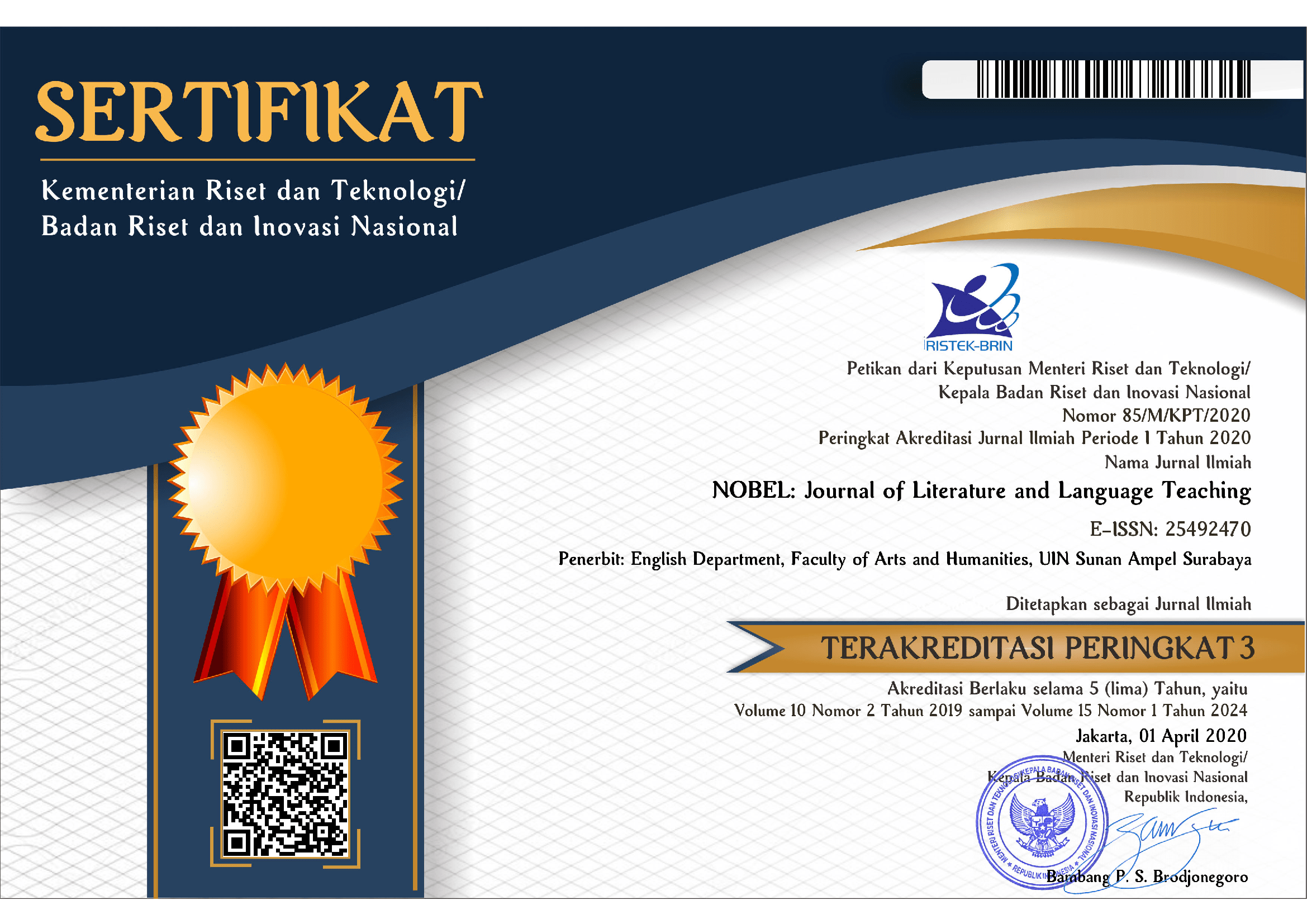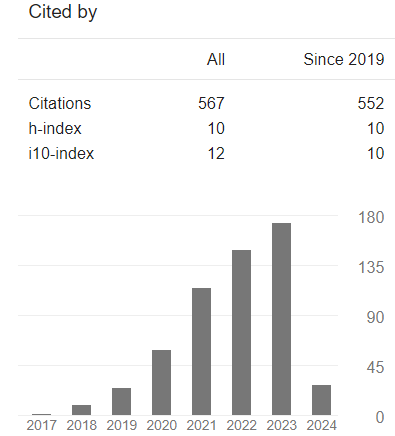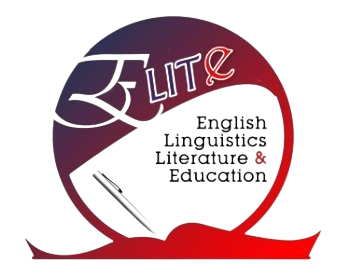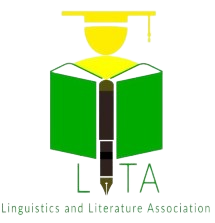Critical Pedagogy through Genre-Based Pedagogy for Developing Students' Writing Skills: Strategies and Challenges
DOI:
https://doi.org/10.15642/NOBEL.2022.13.1.98-116Keywords:
critical pedagogy; EFL; genre-based pedagogy; Merdeka Belajar; students writing skillsAbstract
This current study discusses critical pedagogy, a concept that supports the paradigm of education for cultural transformation. This concept has been considered an essential approach for developing students' critical thinking and awareness of social issues. Despite its popularity, the implementation of critical pedagogy in classes remains unclear. This paper suggests that critical pedagogy can be concurrent with genre-based pedagogy (GBP), the dominant approach to teaching writing in Indonesia's English language classes. This study argues that language teachers can use GBP to introduce critical pedagogy. This research used descriptive qualitative method, allowing researchers to collect the data from classroom observation in vignettes. The data were taken from four classes where the participant teacher trained students to write argumentative texts. It captured the teaching and learning process in the Context Building and Text Modelling phases. The researchers interpreted and analyzed the data based on the themes identified from the critical pedagogy and GBP literature. It is found that the principles of critical pedagogy such as historicity, problem-posing, emancipation, and dialogic are evident in this study. This study has implications for EFL teachers in Indonesia, especially when they must adapt to "Merdeka Belajar," which promotes critical thinking.
Downloads
References
Abednia, A., & Crookes, G. V. (2019). Critical literacy as a pedagogical goal in English language teaching. In X. Gao (Ed.), Second handbook of English language teaching (pp. 255–275). Springer, Cham. https://doi.org/https://doi.org/10.1007/978-3-030-02899-2
Ariantini, K. P., Suwastini, N. K. A., Adnyani, N. L. P. S., Dantes, G. R., & Jayantini, I. G. A. S. R. (2021). Integrating social media into English language learning: How and to what benefits according to recent studies. NOBEL: Journal of Literature and Language Teaching, 12(1), 92–111. https://doi.org/https://doi.org/10.15642/NOBEL.2021.12.1.91-111
Chandrasoma, R., & Ananda, L. (2018). Intertextualizing interactive texts for critical thinking: A South Korean EFL experience. Critical Inquiry in Language Studies, 15(2), 115–140. https://doi.org/https://doi.org/10.1080/15427587.2017.1357038
Emilia, E., & Hamied, F. A. (2015). Systemic functional linguistic genre pedagogy (SFL GP) in a tertiary EFL writing context in Indonesia. TEFLIN Journal, 26(2), 155–182. https://doi.org/http://dx.doi.org/10.15639/teflinjournal.v26i2/155-182
Feez, S. (1999). Text-based syllabus design. Interchange, 34, 5–11. https://search.informit.org/doi/abs/10.3316/aeipt.102934
Freire, P. (2000). Pedagogy of freedom: Ethics, democracy, and civic courage. Rowman & Littlefield Publishers.
Giroux, H. A. (2018). When schools become dead zones of the imagination: A critical pedagogy manifesto. In K. J. Saltman & A. J. Means (Eds.), The Wiley Handbook of Global Educational Reform (pp. 503–515). Wiley Online Library. https://doi.org/https://doi.org/10.1002/9781119082316.ch24
Halliday, M. A. K. (1995). Discourse in society: Systemic functional perspectives (Issue 50). Greenwood Publishing Group.
Hammond, J., & Macken-Horarik, M. (1999). Critical literacy: Challenges and questions for ESL classrooms. Tesol Quarterly, 33(3), 528–544. https://doi.org/https://doi.org/10.2307/3587678
Huang, Y., & Jun Zhang, L. (2020). Does a process-genre approach help improve students’ argumentative writing in English as a foreign language? Findings from an intervention study. Reading & Writing Quarterly, 36(4), 339–364. https://doi.org/https://doi.org/10.1080/10573569.2019.1649223
Kakouris, A. (2015). Entrepreneurship pedagogies in lifelong learning: Emergence of criticality? Learning, Culture and Social Interaction, 6(2015), 87–97. https://doi.org/https://doi.org/10.1016/j.lcsi.2015.04.004
Kubota, R., & Miller, E. R. (2017). Re-examining and re-envisioning criticality in language studies: Theories and praxis. Critical Inquiry in Language Studies, 14(2–3), 129–157. https://doi.org/https://doi.org/10.1080/15427587.2017.1290500
Kurniawati, N., Sugaryamah, D., & Hasanah, A. (2020). Proposing a model of critical literacy program for fostering Indonesian EFL students’ critical thinking skills. Journal of Education and Learning (EduLearn), 14(2), 234–247. https://doi.org/10.11591/edulearn.v14i2.15084
Larson, K. R. (2014). Critical pedagogy (ies) for ELT in Indonesia. TEFLIN Journal, 25(1), 122–138. https://doi.org/http://dx.doi.org/10.15639/teflinjournal.v25i1/122-138
Mahyudi, J., Mahsun, M., & Rusdiawan, R. (2020). Sosialisasi keterampilan siswa SMP dalam memproduksi teks bergenre cerita kepada guru bahasa Indonesia se-kabupaten Lombok Tengah. Jurnal Pendidikan Dan Pengabdian Masyarakat, 3(2). https://jurnalfkip.unram.ac.id/index.php/JPPM/article/view/1857
Mambu, J. E. (2018). Critical pedagogy in the ELF era: An Indonesian-based English language teacher educator’s reflection. In Teacher Education for English as a Lingua Franca (pp. 41–57). Routledge. https://www.taylorfrancis.com/chapters/edit/10.4324/9780203730522-3/critical-pedagogy-elf-era-joseph-ernest-mambu
Manojan, M. (2019). Capturing the Gramscian project in critical pedagogy: Towards a philosophy of praxis in education. Review of Development and Change, 24(1), 123–145. https://doi.org/10.1177/0972266119831133
Mauludin, L. A. (2020). Joint construction in genre-based writing for students with higher and lower motivation. Southern African Linguistics and Applied Language Studies, 38(1), 46–59. https://doi.org/https://doi.org/10.2989/16073614.2020.1750965
Mirabella, R. M., & Nguyen, K. (2019). Educating nonprofit students as agents of social transformation: Critical public administration as a way forward. Administrative Theory & Praxis, 41(4), 388–404. https://doi.org/https://doi.org/10.1080/10841806.2019.1643616
Morrell, E. (2003). Writing the word and the world: Critical literacy as critical textual production. Annual Meeting of the Conference on College Composition and Communication, 1–25. https://files.eric.ed.gov/fulltext/ED475208.pdf
Norton, B., & Toohey, K. (2011). Identity, language learning, and social change. Language Teaching, 44(4), 412–446. https://doi.org/https://doi.org/10.1017/S0261444811000309
Nusantari, E., Abdul, A., Damopolii, I., Alghafri, A. S. R., & Bakkar, B. S. (2021). Combination of discovery learning and metacognitive knowledge strategy to enhance students’ critical thinking skills. European Journal of Educational Research, 10(4), 1781–1791. https://doi.org/https://doi.org/10.12973/eu-jer.#10.4.1781
Qoyyimah, U., Singh, P., Doherty, C., & Exley, B. (2020). Teachers’ professional judgement when recontextualising Indonesia’s official curriculum to their contexts. Pedagogy, Culture & Society, 28(2), 183–203. https://doi.org/https://doi.org/10.1080/14681366.2019.1625069
Qoyyimah, U., Singh, P., Exley, B., Doherty, C., & Agustiawan, Y. (2020). Professional identity and imagined student identity of EIL teachers in Islamic schools. Journal of Language, Identity & Education, 1–16. https://doi.org/https://doi.org/10.1080/15348458.2020.1833726
Retnaningdyah, P. (2019). A TESOL practicum in Indonesia. In Current Perspectives on the TESOL Practicum (pp. 153–171). Springer. https://doi.org/10.1007/978-3-030-28756-6_8
Shih, Y.-H. (2018). Some critical thinking on Paulo Freire’s critical pedagogy and its educational implications. International Education Studies, 11(9), 64–70. https://doi.org/https://doi.org/10.5539/ies.v11n9p64
Sibbett, L. A. (2016). Toward a transformative criticality for democratic citizenship education. Democracy and Education, 24(2), 1. https://democracyeducationjournal.org/home/vol24/iss2/1/
Tehseem, T., Bokhari, Z., & Zulfiqar, S. (2020). Human rights education and language learning in Pakistan: An EFL perspective. Journal of Education and Educational Development, 7(2), 216–243. https://doi.org/https://doi.org/10.22555/joeed.v7i2.143
Troyan, F. J., Harman, R., & Zhang, X. (2021). Critical SFL praxis in teacher education: Insights from Australian SFL scholars. Language and Education, 35(5), 383–401. https://doi.org/https://doi.org/10.1080/09500782.2020.1807563
Varenina, L., Vecherinina, E., Shchedrina, E., Valiev, I., & Islamov, A. (2021). Developing critical thinking skills in a digital educational environment. Thinking Skills and Creativity, 41, 100906. https://doi.org/https://doi.org/10.1016/j.tsc.2021.100906
Wallowitz, L. (2008). Critical literacy as resistance: Teaching for social justice across the secondary curriculum (Vol. 326). Peter Lang.
Weng, T. (2021). Creating Critical Literacy Praxis: Bridging the Gap between Theory and Practice. RELC Journal, 0033688220982665. https://doi.org/https://doi.org/10.1177%2F0033688220982665
White, J. W. (2009). Reading" the word and the world": The double-edged sword of teaching critical literacy. Voices from the Middle, 17(2), 55. https://www.proquest.com/openview/a6141ee75b1df026ef1e916fc1695263/1?pq-origsite=gscholar&cbl=33274
Yuhastina, Y., Parahita, B. N., Astutik, D., Ghufronudin, G., & Purwanto, D. (2020). Sociology teachers’ opportunities and challenges in facing “Merdeka Belajar” curriculum in the fourth industrial revolution (Industry 4.0). Society, 8(2), 732–753. https://doi.org/https://doi.org/10.33019/society.v8i2.234
Yulianto, S. W. Y. (2020). The use of critical pedagogy principles in teaching English as a foreign language (EFL) for senior high school students in Subang. Biormatika: Jurnal Ilmiah Fakultas Keguruan Dan Ilmu Pendidikan, 6(1), 98–106. https://doi.org/https://doi.org/10.35569/biormatika.v6i1.698
Downloads
Published
How to Cite
Issue
Section
License
Copyright (c) 2022 NOBEL: Journal of Literature and Language Teaching

This work is licensed under a Creative Commons Attribution 4.0 International License.







